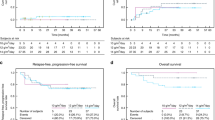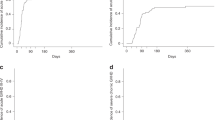Abstract
The purpose of this study was to determine the feasibility and efficacy of multiple courses of high-dose cyclophosphamide, carboplatin and thiotepa with peripheral blood progenitor cell (PBPC) transplantation in women with advanced breast cancer. Forty-one patients with advanced hormone-refractory breast cancer were enrolled in the study. The treatment started with two courses of 5-fluorouracil 500 mg/m2, epirubicin 120 mg/m2 and cyclophosphamide 500 mg/m2 (FE120C) followed by PBPC harvesting. The high-dose regimen consisted of three subsequent courses of ‘tiny’ CTC, cyclophosphamide 4000 mg/m2, thiotepa 320 mg/m2 and carboplatin 1060 mg/m2 (target AUC 13.3 mg/ml/min) (tCTC) divided over 4 consecutive days. The second and third courses were scheduled to begin on day 28 after the previous transplantation. A total of 86 tCTC courses was given to 33 of the 41 enrolled patients. Major toxicities consisted of hemorrhagic cystitis (six patients), prolonged gastro-intestinal toxicity (three patients) and veno-occlusive disease (two patients). There was one therapy-related death (unknown cause). Twenty patients (49%) achieved a complete response, nine (22%) a partial response and three patients stable disease after treatment. The median follow-up of the surviving patients was 43 months (range 25–61). Six patients remain in complete remission beyond 3 years. At 4 years, the progression-free survival (PFS) and overall survival (OS) for the whole patient group were 23 and 30% with a median duration of 12 and 27 months, respectively and for FE120C-responsive patients 32 and 36%, respectively with a median duration of 15 and 33 months. In the patient group with a PFS ⩾ 18 months all patients had limited disease (metastatic disease in only one or two sites) and fewer patients had bone or liver metastases compared to the overall patient group (33% vs 51%). This report shows that three closely spaced courses of tCTC are feasible, with acceptable toxicity. Triple tCTC can achieve complete or partial remission in most patients and long-term PFS in a selected subgroup of patients who have limited metastatic disease and are responsive to conventional-dose chemotherapy. Bone Marrow Transplantation (2001) 28, 173–180.
This is a preview of subscription content, access via your institution
Access options
Subscribe to this journal
Receive 12 print issues and online access
$259.00 per year
only $21.58 per issue
Buy this article
- Purchase on Springer Link
- Instant access to full article PDF
Prices may be subject to local taxes which are calculated during checkout


Similar content being viewed by others
References
Antman KS, Rowlings PA, Vaughan WP et al. High-dose chemotherapy with autologous hematopoietic stem-cell support for breast cancer in North America J Clin Oncol 1997 15: 1870–1879
Grathwohl A, Passweg J, Baldomero H et al. Blood and marrow transplantation activity in Europe 1997. European Group for Blood and Marrow Transplantation (EBMT) Bone Marrow Transplant 1999 4: 231–245
Peters WP, Dansey RD, Klein JL et al. High-dose chemotherapy and peripheral blood progenitor cell transplantation in the treatment of breast cancer Oncologist 2000 5: 1–13
Rizzieri DA, Vredenburgh JJ, Jones R et al. Prognostic and predictive factors for patients with metastatic breast cancer undergoing aggressive induction therapy followed by high-dose chemotherapy with autologous stem-cell support J Clin Oncol 1999 17: 3064–3074
Dunphy FR, Spitzer G, Fornoff JE et al. Factors predicting long-term survival for metastatic breast cancer patients treated with high-dose chemotherapy and bone-marrow support Cancer 1994 73: 2157–2167
Ayash LJ, Wheeler C, Fairclough D et al. Prognostic factors for prolonged progression-free survival with high-dose chemotherapy with autologous stem-cell support for advanced breast cancer J Clin Oncol 1995 13: 2043–2049
Stadtmauer EA, O'Neill A, Goldstein LJ et al. Conventional-dose chemotherapy compared with high-dose chemotherapy plus autologous hematopoietic stem-cell transplantation for metastatic breast cancer New Engl J Med 2000 342: 1069–1076
Rodenhuis S, Westermann AM, Holtkamp MJ et al. Feasibility of multiple courses of high dose cyclophosphamide, thioTEPA and carboplatin for breast cancer or germ cell cancer J Clin Oncol 1996 14: 1473–1483
Rodenhuis S, Huitema ADR, Baars JW et al. Multiple courses of cyclophosphamide, thioTEPA and carboplatin: managing toxicity by dose reduction and pharmacokinetic monitoring In: Dicke KA, Keaty A (eds) Autologous Blood and Bone Marrow Transplantation Proc Ninth Int Symposium, Arlington, Texas, Carden Jennings: Charlottesville, VA 1999 pp 422–434
Van der Wall E, Rutgers EJT, Holtkamp MJ et al. Efficacy of up-front FEC-chemotherapy with an increased dose of epirubicin in high risk breast cancer Br J Cancer 1996 73: 1080–1085
Van der Wall E, Nooijen WJ, Holtkamp MJ et al. High-dose carboplatin, thioTEPA and cyclophosphamide (CTC) with peripheral blood stem cell support in the adjuvant therapy of high-risk breast cancer: a practical approach Br J Cancer 1995 71: 857–862
Van der Wall E, Richel DJ, Holtkamp MJ et al. Bone marrow reconstitution after high-dose chemotherapy and autologous peripheral stem cell transplantation: correlation with graft size Ann Oncol 1994 5: 795–802
Westermann AM, Holtkamp MM, Linthorst GA et al. At home management of aplastic phase following high-dose chemotherapy with stem-cell rescue for hematological and non-hematological malignancies Ann Oncol 1999 10: 511–517
Antman KH, Ayash L, Elias A et al. High-dose cyclophosphamide, thiotepa, and carboplatin with autologous bone marrow support in women with measurable advanced breast cancer responding to standard-dose chemotherapy: analysis by age J Natl Cancer Inst Monogr 1994 16: 91–94
Reed E, Tarantolo S, Cowles K et al. Prognostic factors for patients with metastatic breast cancer with high-dose cyclophosphamide, thiotepa, hydroxyurea and hematopoietic stem cell rescue Proc Am Soc Clin Oncol 1995 14: 23 (Abstr. 190)
Rowlings PA, Williams SF, Antman KH et al. Factors correlated with progression-free survival after high-dose chemotherapy and hematopoietic stem cell transplantation for metastatic breast cancer JAMA 1999 282: 1335–1343
Chang J, Powles TJ, Allred DC et al. Biologic markers as predictors of clinical outcome from systemic therapy for primary operable breast cancer J Clin Oncol 1999 17: 3058–3063
Crown J, Kritz A, Vahdat L et al. Rapid administration of multiple cycles of high-dose myelosuppressive chemotherapy in patients with metastatic breast cancer J Clin Oncol 1993 11: 1144–1149
Norton L, Day R . Potential innovation in scheduling of cancer chemotherapy In: DeVita (ed.) Important Advances in Oncology Lippincott, Williams and Wilkins: Philadelphia 1991 pp 51–57
Goldie JH . Mathematical models of drug resistance and chemotherapy effects Cancer Treat Res 1989 48: 13–26
Haioun C, Lepage E, Gisselbrecht C et al. Benefit of autologous bone marrow transplantation over sequential chemotherapy in poor-risk aggressive non-Hodgkin's lymphoma: updated results of the prospective study LNH87–2. Groupe d'Etude des Lymphomes de Adulte J Clin Oncol 1997 15: 1131–1137
De Vries EG, Rodenhuis S, Schouten HC et al. Phase II study of intensive chemotherapy with autologous bone marrow transplantation in patients in complete remission of disseminated breast cancer Breast Cancer Res Treat 1996 39: 307–313
Gianni AM, Siena S, Bregni M et al. Efficacy, toxicity, and applicability of high-dose sequential chemotherapy as adjuvant treatment in operable breast cancer with 10 or more involved axillary nodes: five-year results J Clin Oncol 1997 15: 2312–2321
Goldie JH, Coldman AJ, Ng V et al. A mathematical and computer-based model of alternating chemotherapy and radiation therapy in experimental neoplasms Antibiot Chemother 1988 41: 11–20
Boccardo F, Rubagotti A, Amoroso D et al. Lack of effectiveness of adjuvant alternating chemotherapy in node-positive, estrogen-receptor-negative premenopausal breast cancer patients: results of a multicentric Italian study. The Breast Cancer Adjuvant Chemo-Hormone Therapy Cooperative Group (GROCTA) Cancer Invest 1997 15: 505–512
Bonadonna G, Zambetti M, Valagussa P . Sequential or alternating doxorubicin and CMF regimens in breast cancer with more than three positive nodes. Ten-year results JAMA 1995 273: 542–547
Goldie JH . Arguments supporting the concept of non-cross-resistant combinations of chemotherapy Cancer Invest 1994 12: 324–328
Frei E III, Antman K, Teicher B et al. Bone marrow autotransplantation for solid tumors – prospects J Clin Oncol 1989 7: 515–526
Greenberg PAC, Hortobagyi GN, Smith TL et al. Long-term follow-up of patients with complete remission following combination chemotherapy for metastatic breast cancer J Clin Oncol 1996 14: 2197–2205
Alizadeh AA, Eisen MB, Davis E et al. Distinct types of diffuse large cell lymphoma identified by gene expression profiling Nature 2000 403: 503–511
Sgroi DC, Teng S, Robinson G et al. In vivo gene expression profile analysis of human breast cancer progression Cancer Res 1999 59: 5656–5661
Demagalhaes-Silverman M, Hammert L, Lembersky B et al. High-dose chemotherapy and autologous stem cell support followed by post-transplant doxorubicin and taxol as initial therapy for metastatic breast cancer: hematopoietic tolerance and efficacy Bone Marrow Transplant 1998 21: 1207–1211
Acknowledgements
This study was supported in part by a grant from the Schumacher-Kramer Foundation and by NKI 97–1439 of the Dutch Cancer Society.
Author information
Authors and Affiliations
Rights and permissions
About this article
Cite this article
Schrama, J., Baars, J., Holtkamp, M. et al. Phase II study of a multi-course high-dose chemotherapy regimen incorporating cyclophosphamide, thiotepa, and carboplatin in stage IV breast cancer. Bone Marrow Transplant 28, 173–180 (2001). https://doi.org/10.1038/sj.bmt.1703105
Received:
Accepted:
Published:
Issue Date:
DOI: https://doi.org/10.1038/sj.bmt.1703105
Keywords
This article is cited by
-
CYP1A1 genetic polymorphism is a promising predictor to improve chemotherapy effects in patients with metastatic breast cancer treated with docetaxel plus thiotepa vs. docetaxel plus capecitabine
Cancer Chemotherapy and Pharmacology (2018)
-
High exposures to bioactivated cyclophosphamide are related to the occurrence of veno-occlusive disease of the liver following high-dose chemotherapy
British Journal of Cancer (2006)
-
Prolonged survival associated with early lymphocyte recovery after autologous hematopoietic stem cell transplantation for patients with metastatic breast cancer
Bone Marrow Transplantation (2003)
-
Toxicity of the high-dose chemotherapy CTC regimen (cyclophosphamide, thiotepa, carboplatin): the Netherlands Cancer Institute experience
British Journal of Cancer (2003)
-
High-dose epirubicin, preceded by dexrazoxane, given in combination with paclitaxel plus filgrastim provides an effective mobilizing regimen to support three courses of high-dose dense chemotherapy in patients with high-risk stage II–IIIA breast cancer
Bone Marrow Transplantation (2003)



